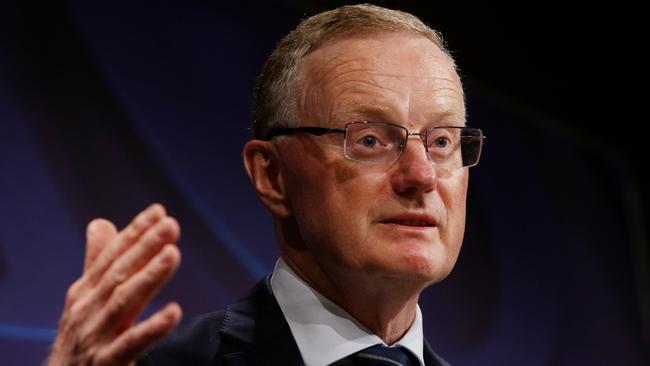Ukraine doesn’t need co-ordinated central bank response yet, says RBA governor Philip Lowe
Reserve Bank governor Philip Lowe was to confer with central bank peers to discuss the impact of the Ukraine crisis on financial markets.

Reserve Bank governor Philip Lowe was to join a call with central bank peers late on Friday night AEDT to discuss the impact of the war in Ukraine and Russian sanctions on financial markets, but does not see a need for a co-ordinated monetary policy response – just yet.
While noting that central banks worked very closely to co-ordinate a lowering of interest rates during the global financial crisis of 2008, Dr Lowe said it was not yet at that point, but “it’s still early days”.
“I chair the Bank for International Settlements Committee on the global financial system, so we had a meeting last week and the developments in Ukraine were clearly the issue that we were talking about,” he told the Australian Bankers Association conference in Sydney on Friday.
“Tonight ... I’m speaking with the governors of all the central banks who’ve got a kind of regularly scheduled meeting.
“So you can imagine what the topic will be on. But the idea that there’s some sort of co-ordinated policy response – we don’t really talk in those terms.”
Dr Lowe added that a co-ordinated response to financial markets turmoil during the global financial crisis was largely because markets had frozen.
“At the moment, I don’t think there’s a need for a co-ordinated policy response,” he said. “What there is a need to do is sit down and share information and talk about where things might go from here, and we’ll do that.”
Dr Lowe also confirmed that a significant part of discussions would be about the impact that sanctions on Russia were having on the financial system.
“The assessment has kind of been, in the first couple of weeks, it hasn’t caused major dislocation in the financial system – it’s causing dislocation in Russia, but not in the global financial system, but it’s still early days,” he said.
“There’s a lot to come for these sanctions to work their way through the financial sector and we’ll look at that again tonight.”
But in his opening address at the ABA conference, Dr Lowe said the possibility of higher interest rates was an issue on which all central banks “need to plan”.
He cautioned that there were a lot of borrowers and lenders, who have not had any experience with a rising interest rate cycle since the RBA had not increased rates since 2010. “So for many borrowers, that’s going to come as quite an unwelcome development,” he said.
But the RBA would not lift interest rates until underlying inflation was sustainably within its target band and “we are not yet at that point”.
Dr Lowe said underlying inflation was “only” at 2.6 per cent on the back of really unprecedented disruptions in global supply chains, and aggregate wages growth remained at pre-pandemic levels around 2.25 to 2.5 per cent, which delivered inflation consistently below 2 per cent.
“Wage growth is still modest and some of the increase in prices that we’ve seen is from supply chain disruptions that we would expect to reverse over time, so we’re not yet at the point where we can conclude that inflation is sustainably within the 2-3 per cent range.”
Still, he conceded that the Ukraine war had “moved us closer to that point”.
“Inflation has been higher than we were expecting, the global supply chains are proving more contracted and taking longer to resolve than was widely thought likely, and in the last couple of weeks, the Russian invasion of Ukraine is pushing up commodity prices right across the board,” he said.
“So given these developments, it is plausible that interest rates will increase this year.”
Dr Lowe said that before the Ukraine war, there were signs that the disruptions to the supply chain were starting to be resolved, but “now we’ve added another major supply shock”.
Another issue was “inflation psychology”.
Dr Lowe said it was “quite possible” a period of protracted inflation would lead firms to decide whether they had to put up their prices and if they could afford to pay higher wages.
“We are watching very carefully for any shift in the inflation psychology and if that shift were to occur, inflation would be higher and it would be more persistent and we would need to respond to that in time,” he warned.
While noting that a pick-up in wages growth was “clearly taking place”, Dr Lowe also said it would be “quite some time before wage picks up substantially”.
Dr Lowe also said the country needed to plan for the “changing nature of money” as it was “silly” to think that innovation in that area was finished. “We can’t be sure, but it’s likely to be some sort of digital token,” he said.
Issues that the RBA was weighing on digital tokens include their security, whether they would be backed and issued by the central bank and if they pay interest.
Another big question for the RBA is whether tokens might destabilise the financial system.
“We need to prepare for them … there’s a lot of work that needs to be done,” Dr Lowe said. Australians, he added, must also plan for climate change, which is a “first order issue for the financial system”.
“The financial sector has an important role to play here,” Dr Lowe said, adding that industry could only supply financing if the risks could be priced.
“Unfortunately we are not yet at a point where there are widely accepted international disclosures,” he said. “It’s a huge challenge for the future.”



